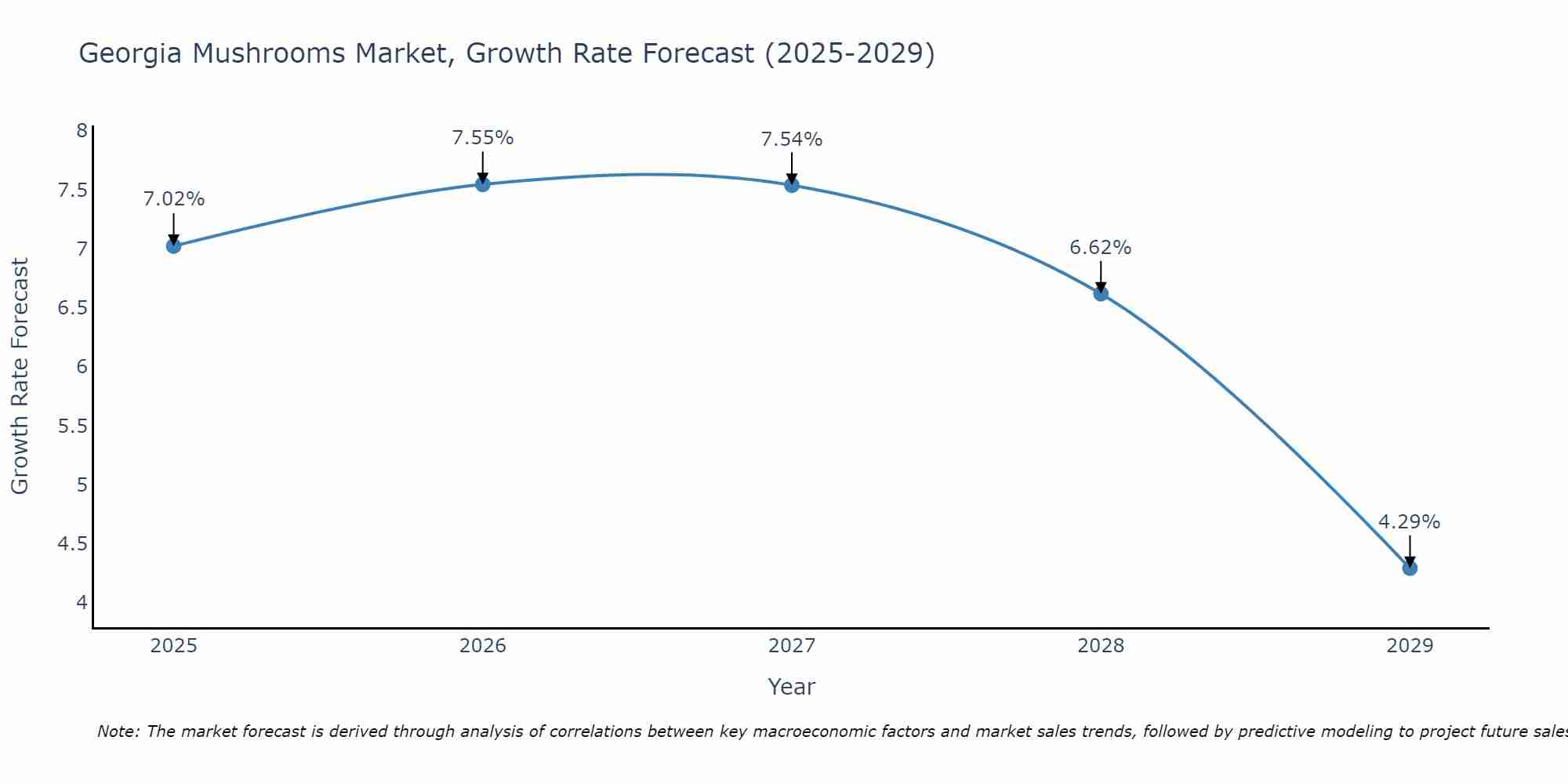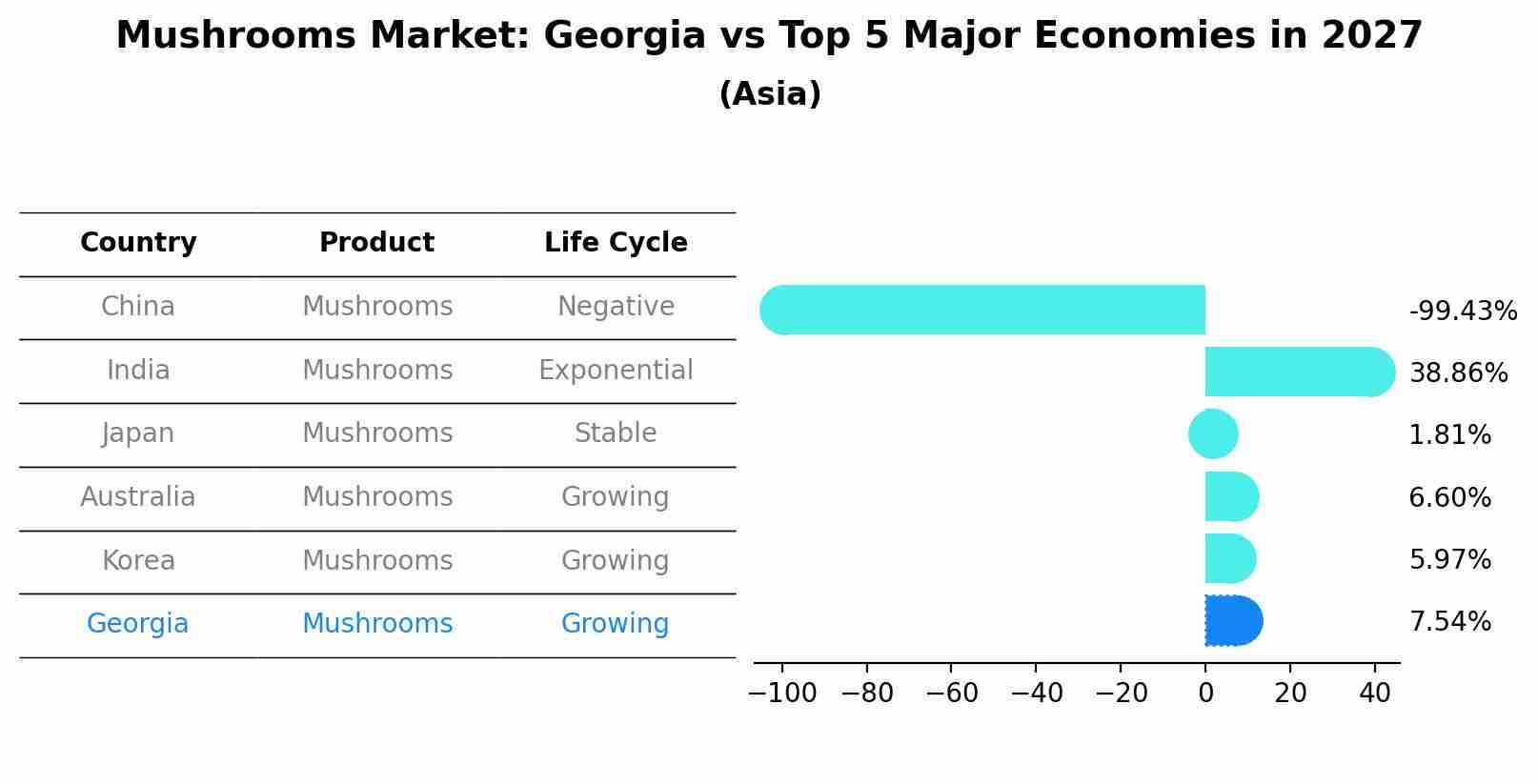Georgia Mushrooms Market (2025-2031) Outlook | Revenue, Growth, Value, Analysis, Industry, Size, Forecast, Trends, Companies & Share
| Product Code: ETC383220 | Publication Date: Aug 2022 | Updated Date: Jul 2025 | Product Type: Market Research Report | |
| Publisher: 6Wresearch | Author: Shubham Deep | No. of Pages: 75 | No. of Figures: 35 | No. of Tables: 20 |
Georgia Mushrooms Market Size Growth Rate
The Georgia Mushrooms Market is projected to witness mixed growth rate patterns during 2025 to 2029. Growth accelerates to 7.55% in 2026, following an initial rate of 7.02%, before easing to 4.29% at the end of the period.

Mushrooms Market: Georgia vs Top 5 Major Economies in 2027 (Asia)
By 2027, Georgia's Mushrooms market is forecasted to achieve a growing growth rate of 7.54%, with China leading the Asia region, followed by India, Japan, Australia and South Korea.

Georgia Mushrooms Market Synopsis
The Georgia mushrooms market is experiencing steady growth due to increasing consumer interest in plant-based diets and gourmet cooking. Market players are focusing on product innovation and sustainable farming practices to meet the demand for fresh and organic mushrooms. Button mushrooms are the most commonly consumed variety in Georgia, followed by shiitake and oyster mushrooms. Local farmers and small-scale producers dominate the market, supplying both fresh and processed mushroom products to supermarkets, restaurants, and farmers` markets. The market is also witnessing a rise in specialty mushrooms such as lion`s mane and reishi, driven by their perceived health benefits and unique flavors. Overall, the Georgia mushrooms market presents opportunities for expansion and diversification, with a strong emphasis on quality, variety, and sustainability.
Georgia Mushrooms Market Trends
The Georgia mushrooms market is experiencing a growing demand for exotic and gourmet mushroom varieties such as shiitake, oyster, and maitake due to increasing consumer interest in unique flavors and health benefits. Locally cultivated mushrooms are gaining popularity as consumers prioritize fresh, sustainably sourced produce. There is also a rising trend towards plant-based diets and meat alternatives, driving the demand for mushrooms as a versatile and nutritious ingredient. Additionally, the market is seeing a surge in awareness about the medicinal properties of certain mushroom species like reishi and lion`s mane, leading to an increased interest in functional foods and supplements. Overall, the Georgia mushrooms market is evolving to cater to the changing preferences and demands of health-conscious consumers seeking diverse and innovative culinary experiences.
Georgia Mushrooms Market Challenges
In the Georgia mushrooms market, some key challenges include competition from imported mushrooms, fluctuating consumer demand, and seasonality of mushroom production. Imported mushrooms, often cheaper due to lower production costs in other countries, pose a competitive threat to local mushroom growers. Fluctuating consumer demand, influenced by factors like health trends and economic conditions, can make it challenging for growers to forecast sales accurately. Additionally, the seasonality of mushroom production can lead to supply shortages or surpluses, impacting prices and profitability for growers. To navigate these challenges, Georgia mushroom growers may need to focus on differentiating their products, optimizing production processes, and diversifying their customer base to remain competitive in the market.
Georgia Mushrooms Market Investment Opportunities
The Georgia mushrooms market presents promising investment opportunities due to the growing consumer preference for healthy and organic food products. With an increasing focus on plant-based diets and sustainability, there is a rising demand for mushrooms as a nutritious and versatile ingredient. Investors can explore opportunities in mushroom cultivation businesses, distribution channels, value-added products like mushroom powders or extracts, as well as research and development for innovative mushroom-based products. Additionally, the Georgia climate and agricultural infrastructure provide favorable conditions for mushroom cultivation, offering a competitive advantage in the market. Investing in the Georgia mushrooms market aligns with current food trends and presents potential for growth and profitability in the evolving food industry landscape.
Jordan Agar Market Government Policies
The Georgia Mushrooms Market is subject to various government policies that regulate farming practices, food safety standards, and environmental sustainability. The Georgia Department of Agriculture oversees the licensing and inspection of mushroom farms to ensure compliance with health and safety regulations. Additionally, there are policies in place to promote sustainable agriculture practices, such as waste management and water conservation initiatives. The government also provides support for research and development in the mushroom industry to enhance productivity and quality. Overall, government policies aim to foster a competitive and sustainable mushrooms market in Georgia while prioritizing consumer health and environmental protection.
Georgia Mushrooms Market Future Outlook
The future outlook for the Georgia mushrooms market appears promising, with growing consumer interest in plant-based diets and healthy eating driving demand for mushrooms as a versatile and nutritious ingredient. The state`s favorable climate and agricultural infrastructure provide opportunities for increased cultivation of a variety of mushroom types, including shiitake, oyster, and portobello. Additionally, the rising popularity of specialty and exotic mushrooms offers further growth potential for the market in Georgia. With a focus on sustainability and local sourcing becoming increasingly important to consumers, Georgia`s mushroom producers have the opportunity to capitalize on these trends and expand their market share both domestically and potentially even internationally in the coming years.
Key Highlights of the Report:
- Georgia Mushrooms Market Outlook
- Market Size of Georgia Mushrooms Market, 2024
- Forecast of Georgia Mushrooms Market, 2031
- Historical Data and Forecast of Georgia Mushrooms Revenues & Volume for the Period 2021 - 2031
- Georgia Mushrooms Market Trend Evolution
- Georgia Mushrooms Market Drivers and Challenges
- Georgia Mushrooms Price Trends
- Georgia Mushrooms Porter's Five Forces
- Georgia Mushrooms Industry Life Cycle
- Historical Data and Forecast of Georgia Mushrooms Market Revenues & Volume By Product for the Period 2021 - 2031
- Historical Data and Forecast of Georgia Mushrooms Market Revenues & Volume By Button for the Period 2021 - 2031
- Historical Data and Forecast of Georgia Mushrooms Market Revenues & Volume By Shiitake for the Period 2021 - 2031
- Historical Data and Forecast of Georgia Mushrooms Market Revenues & Volume By Oyster for the Period 2021 - 2031
- Historical Data and Forecast of Georgia Mushrooms Market Revenues & Volume By Matsutake for the Period 2021 - 2031
- Historical Data and Forecast of Georgia Mushrooms Market Revenues & Volume By Truffles for the Period 2021 - 2031
- Historical Data and Forecast of Georgia Mushrooms Market Revenues & Volume By Other for the Period 2021 - 2031
- Historical Data and Forecast of Georgia Mushrooms Market Revenues & Volume By Form for the Period 2021 - 2031
- Historical Data and Forecast of Georgia Mushrooms Market Revenues & Volume By Fresh for the Period 2021 - 2031
- Historical Data and Forecast of Georgia Mushrooms Market Revenues & Volume By Processed for the Period 2021 - 2031
- Historical Data and Forecast of Georgia Mushrooms Market Revenues & Volume By Distribution Channel for the Period 2021 - 2031
- Historical Data and Forecast of Georgia Mushrooms Market Revenues & Volume By Direct to Customer for the Period 2021 - 2031
- Historical Data and Forecast of Georgia Mushrooms Market Revenues & Volume By Grocery Stores for the Period 2021 - 2031
- Historical Data and Forecast of Georgia Mushrooms Market Revenues & Volume By Supermarkets & Hypermarkets for the Period 2021 - 2031
- Historical Data and Forecast of Georgia Mushrooms Market Revenues & Volume By Convenience Stores for the Period 2021 - 2031
- Historical Data and Forecast of Georgia Mushrooms Market Revenues & Volume By Online Stores for the Period 2021 - 2031
- Historical Data and Forecast of Georgia Mushrooms Market Revenues & Volume By Application for the Period 2021 - 2031
- Historical Data and Forecast of Georgia Mushrooms Market Revenues & Volume By Food for the Period 2021 - 2031
- Historical Data and Forecast of Georgia Mushrooms Market Revenues & Volume By Pharmaceutical for the Period 2021 - 2031
- Historical Data and Forecast of Georgia Mushrooms Market Revenues & Volume By Cosmetics for the Period 2021 - 2031
- Georgia Mushrooms Import Export Trade Statistics
- Market Opportunity Assessment By Product
- Market Opportunity Assessment By Form
- Market Opportunity Assessment By Distribution Channel
- Market Opportunity Assessment By Application
- Georgia Mushrooms Top Companies Market Share
- Georgia Mushrooms Competitive Benchmarking By Technical and Operational Parameters
- Georgia Mushrooms Company Profiles
- Georgia Mushrooms Key Strategic Recommendations
Frequently Asked Questions About the Market Study (FAQs):
- Single User License$ 1,995
- Department License$ 2,400
- Site License$ 3,120
- Global License$ 3,795
Search
Related Reports
- Australia IT Asset Disposal Market (2025-2031) | Strategy, Consumer Insights, Analysis, Investment Trends, Opportunities, Growth, Size, Share, Industry, Revenue, Segments, Value, Segmentation, Supply, Forecast, Restraints, Outlook, Competition, Drivers, Trends, Demand, Pricing Analysis, Competitive, Strategic Insights, Companies, Challenges
- UAE Building Thermal Insulation Market Outlook (2025-2031) | Revenue, Companies, Share, Trends, Growth, Size, Forecast, Industry, Analysis & Value
- Portugal Electronic Document Management Market (2025-2031) | Strategy, Consumer Insights, Analysis, Investment Trends, Opportunities, Growth, Size, Share, Industry, Revenue, Segments, Value, Segmentation, Supply, Forecast, Restraints, Outlook, Competition, Drivers, Trends, Demand, Pricing Analysis, Competitive, Strategic Insights, Companies, Challenges
- France Electronic Document Management Market (2025-2031) | Strategy, Consumer Insights, Analysis, Investment Trends, Opportunities, Growth, Size, Share, Industry, Revenue, Segments, Value, Segmentation, Supply, Forecast, Restraints, Outlook, Competition, Drivers, Trends, Demand, Pricing Analysis, Competitive, Strategic Insights, Companies, Challenges
- Portugal Occupational Health & Safety Services Market (2025-2031) | Strategy, Consumer Insights, Analysis, Investment Trends, Opportunities, Growth, Size, Share, Industry, Revenue, Segments, Value, Segmentation, Supply, Forecast, Restraints, Outlook, Competition, Drivers, Trends, Demand, Pricing Analysis, Competitive, Strategic Insights, Companies, Challenges
- Netherlands Occupational Health and Safety Services Market (2025-2031) | Strategy, Consumer Insights, Analysis, Investment Trends, Opportunities, Growth, Size, Share, Industry, Revenue, Segments, Value, Segmentation, Supply, Forecast, Restraints, Outlook, Competition, Drivers, Trends, Demand, Pricing Analysis, Competitive, Strategic Insights, Companies, Challenges
- Belgium and Luxembourg Facility Management Market (2025-2031) | Strategy, Consumer Insights, Analysis, Investment Trends, Opportunities, Growth, Size, Share, Industry, Revenue, Segments, Value, Segmentation, Supply, Forecast, Restraints, Outlook, Competition, Drivers, Trends, Demand, Pricing Analysis, Competitive, Strategic Insights, Companies, Challenges
- Russia Women Intimate Apparel Market (2025-2031) | Strategy, Consumer Insights, Analysis, Investment Trends, Opportunities, Growth, Size, Share, Industry, Revenue, Segments, Value, Segmentation, Supply, Forecast, Restraints, Outlook, Competition, Drivers, Trends, Demand, Pricing Analysis, Competitive, Strategic Insights, Companies, Challenges
- Africa Chocolate Market (2025-2031) | Size, Share, Trends, Growth, Revenue, Analysis, Forecast, industry & Outlook
- Global Hydroxychloroquine And Chloroquine Market (2025-2031) | Industry, Trends, Size, Outlook, Growth, Value, Companies, Revenue, Analysis, Share, Forecast
Industry Events and Analyst Meet
Our Clients
Whitepaper
- Middle East & Africa Commercial Security Market Click here to view more.
- Middle East & Africa Fire Safety Systems & Equipment Market Click here to view more.
- GCC Drone Market Click here to view more.
- Middle East Lighting Fixture Market Click here to view more.
- GCC Physical & Perimeter Security Market Click here to view more.
6WResearch In News
- Doha a strategic location for EV manufacturing hub: IPA Qatar
- Demand for luxury TVs surging in the GCC, says Samsung
- Empowering Growth: The Thriving Journey of Bangladesh’s Cable Industry
- Demand for luxury TVs surging in the GCC, says Samsung
- Video call with a traditional healer? Once unthinkable, it’s now common in South Africa
- Intelligent Buildings To Smooth GCC’s Path To Net Zero













